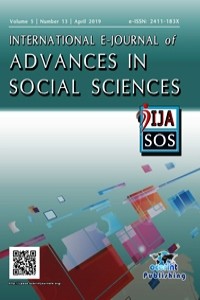Abstract
References
- Khinkanina, A. (2014). Personality's self-restriction phenimenon in complicated situations concerning cultural and historical values bearing. Psychology and psychiatry, sociology and healthcare, education, vol. 1. Khromov, A. B. (2000). Five-factor personality questionnaire: Study guide. Kurgan: Publishing House of the Kurgan State University. Kondratenko, E. V., Biryukova, N. A., Kondratenko, I. B., Akhmetshina, Y. I., Rybakov, A. V. (2017) The development of pedagogical reflection of future teachers through their participation in interactive training. Proceedings of SOCIOINT 2017-4th International Conference on Education, Social Sciences and Humanities 10-12 July 2017. Dubai, UAE. Kostromina, S. N., Grishina, N. V. (2018). The Future of Personality Theory: a Processual Approach. Integrative Psychological and Behavioral Science, 1-11. Miloradova, N. G. (2005). Psychology and pedagogy. Moscow: Gardariki. Paatova, M., Chermit, K., Naumenko, Y. (2018). The concept of the formation of socio-personal viability in adolescents with deviant behaviour. SHS Web of Conferences. Vol. 55. Pakhmutova, M., Bakhtina, S., Andreeva, S., Golovanova, T. (2017). Individual style of activity: the history of the concept and its place in the modern psychology of education. Proceedings of SOCIOINT 2017-4th International Conference on Education, Social Sciences and Humanities 10-12 July 2017. Dubai, UAE. Raigorodskii, D. Y. (2004). Practical psychodiagnostics. Methods and tests. Samara: Publishing House "Bahrah".
THE ABILITY OF THE SUBJECT OF KNOWLEDGE TO SELF-ORGANIZATION OF ACTIVITY AS AN INDICATOR OF SUBJECTIVITY
Abstract
One of the urgent problems of modern psychology of education is the
question of the psychological factors of the formation of the subject of
knowledge in the educational environment of the university. Since the
educational environment of different universities does not always meet the
needs of a developing subject of knowledge, its psychological qualities play a
special role. Therefore, in the modern education system, there is a need to
move from the paradigm of "competences" to the anthropological principle
of education, based on the concept of "subjectivity".
"Subjectivity" in the tradition of Russian psychology is
associated with the ability to self-development and self-education (S.L.
Rubinstein, S.N. Kostromina, V.I. Slobodchikov). An important factor in the
development of subjectivity is the ability to self-organization. In modern
studies there is no description of the relationship between self-organization
of the individual and his subjectivity, which is partly due to the inaccuracy
of the existing definitions. Many scientists (A.D. Ishkov, V.M. Latushkina,
V.I. Morosanova and others) consider self-organization as a set of behavioral
traits, such as responsibility, self-control and foresight. However, we
understand the self-organization of the subject at the stage of vocational
training from the standpoint of a systematic approach, namely, as an integral
system of personal qualities of different nature. The integral system is formed
on the basis of the dominant personal qualities of the subject, which are included
in the activity and are used to achieve certain goals, changing in accordance
with the value attitude to the world. In behavior this system is manifested as
a subject position regarding the activity and its organization.
The purpose of the study was to identify the relationship of the
ability of the subject to self-organization with the development of his
subjectivity. The study involved students of the VolgaStateTechnologicalUniversity
(N = 100). The cross-sectional method allowed us to establish differences
concerning the organization of the activities of students enrolled in different
courses. It is established that self-organization of the personality of senior
students is characterized by the presence of specific integral properties.
Integral properties associated with the value setting of students in research
activities. Senior students, as subjects of knowledge, are focused on the
performance of independent research, which indicates the development of their
subjectivity. Self-organization of the personality of second-year students is
associated with the presence of qualities that can potentially be involved in
research activities and develop in it. However, only to the senior courses the
structure of the integral properties manifests itself most clearly, which
indicates the formation of students' subjectivity. So, we concluded that the
self-organization of the individual is a manifestation of the integrity of the
individual and is associated with the formation of the subjectivity of the
future professional. Research activities of students can act as a condition for
the formation of subjectivity.
References
- Khinkanina, A. (2014). Personality's self-restriction phenimenon in complicated situations concerning cultural and historical values bearing. Psychology and psychiatry, sociology and healthcare, education, vol. 1. Khromov, A. B. (2000). Five-factor personality questionnaire: Study guide. Kurgan: Publishing House of the Kurgan State University. Kondratenko, E. V., Biryukova, N. A., Kondratenko, I. B., Akhmetshina, Y. I., Rybakov, A. V. (2017) The development of pedagogical reflection of future teachers through their participation in interactive training. Proceedings of SOCIOINT 2017-4th International Conference on Education, Social Sciences and Humanities 10-12 July 2017. Dubai, UAE. Kostromina, S. N., Grishina, N. V. (2018). The Future of Personality Theory: a Processual Approach. Integrative Psychological and Behavioral Science, 1-11. Miloradova, N. G. (2005). Psychology and pedagogy. Moscow: Gardariki. Paatova, M., Chermit, K., Naumenko, Y. (2018). The concept of the formation of socio-personal viability in adolescents with deviant behaviour. SHS Web of Conferences. Vol. 55. Pakhmutova, M., Bakhtina, S., Andreeva, S., Golovanova, T. (2017). Individual style of activity: the history of the concept and its place in the modern psychology of education. Proceedings of SOCIOINT 2017-4th International Conference on Education, Social Sciences and Humanities 10-12 July 2017. Dubai, UAE. Raigorodskii, D. Y. (2004). Practical psychodiagnostics. Methods and tests. Samara: Publishing House "Bahrah".
Details
| Primary Language | English |
|---|---|
| Journal Section | Articles |
| Authors | |
| Publication Date | April 28, 2019 |
| Submission Date | February 9, 2019 |
| Published in Issue | Year 2019Volume: 5 Issue: 13 |
Contact: ijasosjournal@hotmail.com
The IJASOS Journal's site and its metadata are licensed under CC BY
Published and Sponsored by OCERINT International © 2015- 2025


